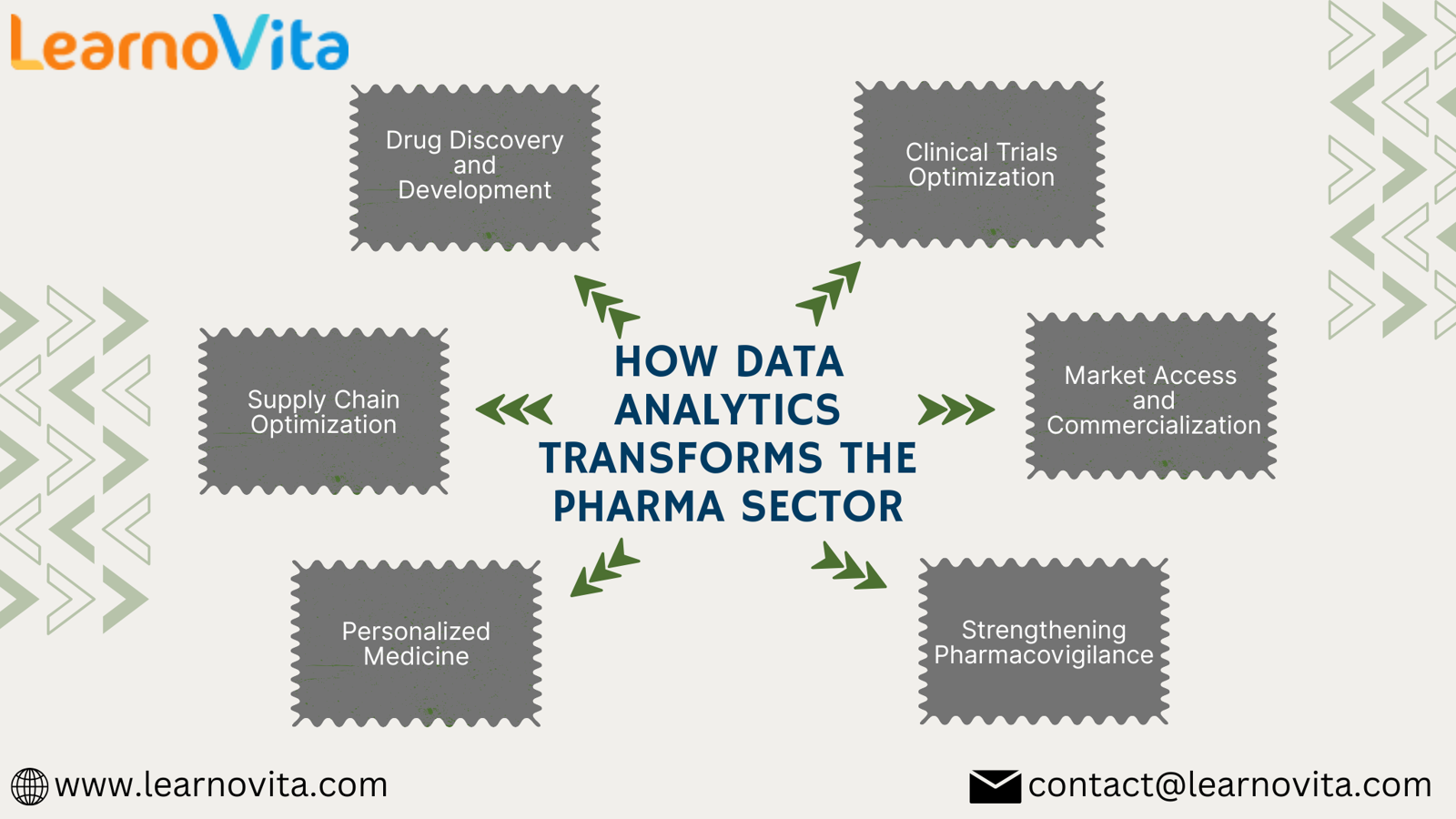The Evolution of Pharma: Leveraging Data Analytics for Enhanced Growth and Efficiency
As the pharmaceutical industry navigates the complexities of modern healthcare, the utilization of data analytics has become a vital factor in driving growth and operational efficiency. By tapping into extensive data resources, pharmaceutical companies can improve decision-making, streamline processes, and ultimately enhance patient outcomes. In this blog, we’ll discuss how leveraging data analytics is shaping the future of the pharmaceutical sector.
If you want to excel in this career path, then it is recommended that you upgrade your skills and knowledge regularly with the latest Data Analytics Online Course.

1. Revolutionizing Drug Development
The journey from drug discovery to market can be long and expensive, often spanning more than a decade. Data analytics is reshaping this process by:
- Accelerating Research: Advanced analytical tools enable researchers to scrutinize large datasets, quickly identifying promising drug candidates. This accelerates the discovery phase and reduces time-to-market.
- Predictive Modeling: By applying machine learning algorithms, companies can forecast how compounds will interact with biological targets, minimizing costly failures during clinical trials.
2. Advancing Clinical Trials
Clinical trials are crucial for assessing the safety and efficacy of new therapies. Data analytics enhances this critical phase by:
- Streamlined Patient Recruitment: Analyzing demographic and health data allows companies to effectively identify and recruit suitable trial participants, increasing enrollment rates and ensuring diverse representation.
- Continuous Monitoring: Data analytics facilitates real-time tracking of trial data, enabling adaptive trial designs that can be modified based on interim findings, thereby boosting the likelihood of success.
3. Promoting Personalized Medicine
The shift towards personalized medicine represents one of the most significant advancements in healthcare. Data analytics supports this transition by:
- Customizing Treatments: By merging genomic data with clinical information, pharmaceutical companies can create targeted therapies tailored to individual patient profiles, leading to improved health outcomes.
- Risk Factor Identification: Data analytics assists in pinpointing patients at higher risk for adverse effects, allowing for safer and more informed prescribing practices.
With the aid of Best Software Training Institute programs, which offer comprehensive training and job placement support to anyone looking to develop their talents, it’s easier to learn this tool and advance your career.

4. Streamlining Supply Chain Management
An effective supply chain is essential for ensuring timely drug delivery. Data analytics enhances supply chain operations by:
- Accurate Demand Forecasting: Analyzing past sales data helps companies predict future demand accurately, optimizing inventory levels and minimizing waste.
- Logistics Optimization: Data-driven insights streamline transportation and distribution processes, ensuring that medications reach patients in a timely and cost-effective manner.
5. Enhancing Pharmacovigilance
Post-market safety is of utmost importance, and data analytics plays a key role in pharmacovigilance by:
- Monitoring Adverse Events: Analyzing reports from healthcare professionals and patients helps identify potential safety signals early, enabling timely interventions and effective risk management.
- Signal Detection: Advanced analytical techniques can reveal patterns in adverse event data, offering insights into emerging safety concerns that need addressing.
6. Facilitating Regulatory Compliance
Navigating the regulatory landscape can be challenging for pharmaceutical companies. Data analytics supports compliance by:
- Efficient Data Management: Organizing and analyzing the extensive data required for regulatory submissions ensures accuracy and completeness, paving the way for smoother approval processes.
- Predictive Compliance Analytics: Historical data can forecast potential regulatory challenges, allowing companies to proactively address issues and ensure adherence to guidelines.
Conclusion
The evolution of pharma rests on the effective harnessing of data analytics to drive growth and efficiency. By leveraging data, pharmaceutical companies can transform drug development, improve clinical trials, enable personalized medicine, and optimize supply chain operations.
As the industry progresses, the integration of data analytics will play a crucial role in shaping a more efficient, effective, and patient-centered healthcare system. Embracing data-driven strategies is not merely a competitive edge; it is essential for any pharmaceutical organization aiming to thrive in today’s complex landscape.
- Questions and Answers
- Opinion
- Motivational and Inspiring Story
- Technology
- Live and Let live
- Focus
- Geopolitics
- Military-Arms/Equipment
- Security
- Economy
- Beasts of Nations
- Machine Tools-The “Mother Industry”
- Art
- Causes
- Crafts
- Dance
- Drinks
- Film/Movie
- Fitness
- Food
- Games
- Gardening
- Health
- Home
- Literature
- Music
- Networking
- Other
- Party
- Religion
- Shopping
- Sports
- Theater
- Health and Wellness
- News
- Culture

